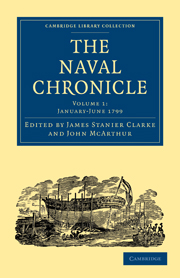 The Naval Chronicle
The Naval Chronicle Book contents
- Frontmatter
- PREFACE TO THE FIRST VOLUME
- BIOGRAPHICAL MEMOIR OF EARL HOWE
- BIOGRAPHICAL MEMOIR OF ADMIRAL SIR CHARLES KNOWLES, BART
- MEMOIRS OF NAVIGATION AND COMMERCE, FROM THE EARLIEST PERIOD
- BIOGRAPHICAL MEMOIR OF THE RIGHT HONOURABLE ALEXANDER ARTHUR HOOD LORD BRIDPORT
- BIOGRAPHICAL MEMOIR OF THE LATE RIGHT HONOURABLE GEORGE BRYDGES, LORD RODNEY, K.B.
- HITORICAL MEMOIR OF NAVAL TRANSACTIONS, DURING THE PRESENT WAR, FROM ITS COMMENCEMENT IN 1793
- MEMOIRS OF NAVIGATION AND COMMERCE, FROM THE EARLIEST PERIODS
- INDEX
- STATE OF THE ROYAL NAVY OF Great Britain, AT THE COMMENCEMENT OF THE YEAR 1799
- THE Marine List OF SHIPS LOST, DESTROYED, CAPTURED, AND RECAPTURED, &c.
- APPENDIX. No. IV
MEMOIRS OF NAVIGATION AND COMMERCE, FROM THE EARLIEST PERIODS
Published online by Cambridge University Press: 10 January 2011
- Frontmatter
- PREFACE TO THE FIRST VOLUME
- BIOGRAPHICAL MEMOIR OF EARL HOWE
- BIOGRAPHICAL MEMOIR OF ADMIRAL SIR CHARLES KNOWLES, BART
- MEMOIRS OF NAVIGATION AND COMMERCE, FROM THE EARLIEST PERIOD
- BIOGRAPHICAL MEMOIR OF THE RIGHT HONOURABLE ALEXANDER ARTHUR HOOD LORD BRIDPORT
- BIOGRAPHICAL MEMOIR OF THE LATE RIGHT HONOURABLE GEORGE BRYDGES, LORD RODNEY, K.B.
- HITORICAL MEMOIR OF NAVAL TRANSACTIONS, DURING THE PRESENT WAR, FROM ITS COMMENCEMENT IN 1793
- MEMOIRS OF NAVIGATION AND COMMERCE, FROM THE EARLIEST PERIODS
- INDEX
- STATE OF THE ROYAL NAVY OF Great Britain, AT THE COMMENCEMENT OF THE YEAR 1799
- THE Marine List OF SHIPS LOST, DESTROYED, CAPTURED, AND RECAPTURED, &c.
- APPENDIX. No. IV
Summary
“Then from ancient gloom emerg'd
The rising world of Trade; the Genius then
Of Navigation, that in hopeless sloth,
Had slumber'd on the vast Atlantic deep,
For idle ages–”
Thomson.Additional observations on the Periplus of Hanno. Mr. Falconer's translation of it noticed. M. Bougainville's opinion of this celebrated navigator. First origin of the maritime power of the ancient Chinese, Indians, Persians, Ethiopians, and Grecians.–Argonautic voyage.–Minos.–Dædalus.
(Continued from Page 195.)
We have traced the progress of Navigation, and Commerce, to the establishment of the Carthaginian power, without branching into a collateral narrative of those States in which the maritime character had also early appeared: obliged, by the nature of our work, to give a confined and limited view of the subject, and that often interrupted, from being continued at intervals, we are anxious to render each number of these Memoirs distinct and interesting. Previous to entering on the history of other Maritime States of the ancient world, we again wish to call our reader's attention to the first voyage, of which we have any particulars remaining, the Periplus of Hanno, the Carthaginian navigator.
In addition to what was advanced in our first Memoir, relative to this most interesting voyage, we have to notice a learned work, which we recommend to the perusal of professional men, and our patrons in general.
- Type
- Chapter
- Information
- The Naval ChronicleContaining a General and Biographical History of the Royal Navy of the United Kingdom with a Variety of Original Papers on Nautical Subjects, pp. 449 - 554Publisher: Cambridge University PressPrint publication year: 2010First published in: 1799
